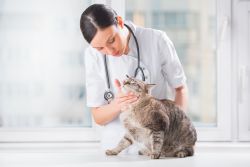
Like their human companions, cats sometimes get runny noses and upper respiratory inflammation. Though the conditions usually aren’t serious, still make an appointment at the pet hospital to properly treat them. Here’s more information about what causes runny noses in felines and how to expedite the healing process.
Your Guide to Runny Noses in Cats
Causes
There are a variety of reasons why your feline friend may come down with a runny nose. Allergies, exposure to bacteria or fungi, upper respiratory infection, and pneumonia are among the most common causes. It’s also possible your cat has polyps or blockages in the nasal cavity. In more serious cases, head trauma or tumors may be to blame.
Diagnosis & Treatment
When you bring your cat to the pet hospital, diagnosis is usually quick and easy. If your veterinarian observes clear nasal discharge, they’ll most likely diagnose a runny nose as a cause of allergies. However, if the discharge contains blood or pus, they’ll likely need to run tests, such as a blood count or CT scan, to rule out the possibility of more serious issues.
Prevention
Though there’s no way to eliminate the possibility of your cat getting the sniffles, immunizations for feline viral rhinotracheitis, calicivirus, and chlamydiosis may help since each of these diseases causes a runny nose. Ask the veterinarian about vaccines during your next appointment at the pet hospital. Cats may also spread infections to one another, so if your feline friend is prone to runny noses, try to keep them away from other animals. Prevent the spread of bacteria by washing your hands before and after handling your pets.
Keep your cats healthy and happy with veterinary care from Alexandria Pike Animal Hospital. This pet hospital offers wellness testing, vaccines, dental care, spaying, neutering, and boarding to animals throughout Newport, KY. Call (859) 781-1800 to request an appointment and visit them online to learn more about their Vaccinations for Life program.
About the Business
Have a question? Ask the experts!
Send your question

